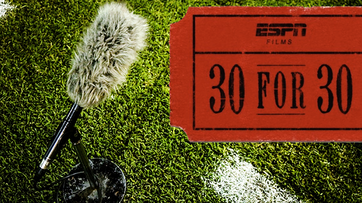 By Christopher Heine It's the new golden age of audio. So it's not entirely surprising that there has been a wealth of new podcasts announced in recent weeks, especially last week during the Interactive Advertising Bureau's second annual Podcast Upfronts. But a big, recent push for sports content is especially intriguing, with Sports Illustrated unveiling a trio of programs, PodcastOne debuting an action-sports play and ESPN announcing that a podcast version of its award-winning, film-style 30 for 30 TV documentaries is forthcoming in early 2017. For sports podcasts to truly make their mark, they may have to differentiate themselves from sports talk radio, ESPN's calling card. Bob Dorfman, a sports marketing expert and creative director at Baker Street Advertiser, suggested the Disney-owned brand is on the right track. "Podcasts can succeed in ways that sports talk radio can't," Dorfman said. "Although they can't match the immediacy and participatory nature of sports talk radio, they can deliver superior storytelling, deeper analysis and richer interviews." We chatted with senior producer at ESPN Films and FiveThirtyEight Jody Avirgan, who's also a WNYC radio veteran and heads up the 30 for 30 podcasts. He gave us the scoop on what sports fans and media observers can expect from ESPN's new venture. Adweek: Have your higher-ups assured you they are going to push this venture across ESPN's properties, such as SportsCenter mentions and ESPN.com homepage real estate? Jody Avirgan: That's a big part of this project, and it was very attractive to me. The entire company is behind it. How much time will your team put into each episode? These will take months. We are giving ourselves the time we need to do them right and report them. They are not spinoffs of the 30 for 30 films. They are original stories, and they are going to be fully produced. We have to do all the interviews, all the research, all the archival work. It is going to take about the same amount of work that a film does. What will be different from the films in terms of the process? There's a team here at ESPN Films that develops an idea, and then it goes to an outside production company or director. That director will take the lead on the nuts and bolts of the production, and ESPN Films will be part of the editorial process—but not the day-to-day in many ways. The fact of the matter is the podcast industry isn't there yet. There's not a dozen of podcast production houses floating around who we could go to and say, "Hey, run with it." So you guys are doing it in-house? We are going to be doing a lot of that work here, inside the building, doing the actual reporting and production. That's why we are hiring a team of five producers who have radio and documentary backgrounds. I do want to get to the point where we are collaborating with other people, maybe even collaborating with filmmakers who would have otherwise made a 30 for 30 film. How long with the 30 for 30 podcasts be? Here's what I can tell you about the format: We are going to give ourselves the space to develop it the way it needs to be developed. I can tell you it won't be like a show—it won't be like flipping a switch, and there will be weekly shows. We are going to do these in batches and seasons. To do a real good documentary that goes deep and breaks some ground and actually has some reporting in it, we are going to need at least a half an hour or 40 minutes. You know, it's not going to be two hours, and it's not going to be 15 minutes. It's going to be a nice, sizable piece of real, narrative journalism. When it comes to the focus, a lot of the 30 for 30 docs have been flashpoints in sports culture history. The Miami Hurricanes one comes to mind—it's also really about the late 1980s and early '90s. So, will the podcasts be cultural flashpoints or slivers of sports history that's completely blown out in a fashion that hadn't been previously done? That's exactly what I am thinking about right now. When I think of my favorite 30 for 30s, I tend to lean toward the ones that have a bigger resonance—the ones that aren't just about a great sports story, but the ones that are about culture, society, politics and an era, the ones that can teach us a little bit more. I think the Miami Hurricanes 30 for 30 you mention is an excellent example, as is The Two Escobars. I have a journalism background. I come from public radio, so I think there's going to be a journalist DNA to most of these podcasts. I am really excited that the 30 for 30 model means there needs to be a great, great story. Your job is to get out of the way. Do what you can to let it ride, let it go from A to B to C to D. You can start to tell the larger [stories], so the listener can have those bigger thoughts. Yeah, a lot of sports podcasting simply reuses talk-radio formats. From the way you sound, this is clearly going to be something different. Yeah, I am hoping we can pull it off. Original publishing can be found on AdWeek.
1 Comment
|
Details
CreatorA. Brent Lovell Archives
May 2017
Categories
All
|

 RSS Feed
RSS Feed